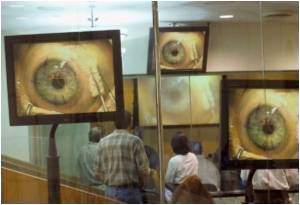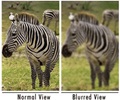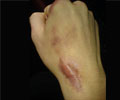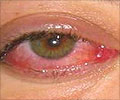
Corneal collagen crosslinking (CXL) using ultraviolet light combined with riboflavin(Vitamin B2) is an investigational procedure designed to strengthen the cornea and decrease the progression of keratoconus. CXL is an investigational procedure and is not approved for use in the United States. However, here at the CLEI Center for Keratoconus, we are participating in a research study of CXL. The goal of the study is to assess the safety and efficacy of crosslinking for the treatment of keratoconus as well as corneal ectasia after LASIK. If successful, CXL may decrease progression of keratoconus and maintain the patient's vision over time.
During the crosslinking procedure, anesthesia drops are administered. The surface epithelial cells of the cornea are then removed and riboflavin drops are administered for30 minutes. The riboflavin acts both to enhance the crosslinking effect and to protect the rest of the eye from the UV exposure.
The patient then looks at a UV emitting light for 30 minutes. At the conclusion of the procedure, a soft contact lens bandage is applied. The contact lens is left in place toimprove healing for approximately 5 days and is then removed. Antibiotic and anti-inflammatory drops are used for two weeks afterwards.
Source-Eurekalert













